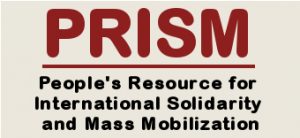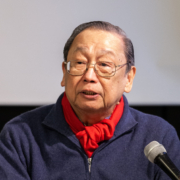Joma Sison on the global situation and Covid-19 pandemic
On 9 April 2020, Prof. Joma Sison held a forum via Facebook Live to an online audience of nearly 300 people. Here he gave a concise summary of the current international situation replete with major earth-shaking events unfolding before our eyes, including the Covid-19 pandemic and what is shaping out as the beginnings of a new Great Recession equal to or even worse than the Great Depression of 1929 onwards to the 1930s. Sison explained that “the world capitalist system was already in trouble even before the Covid-19 pandemic arose. And the pandemic has unmasked and aggravated the crisis of global capitalism. It is of urgent importance to know how the people are affected and how they are responding.”
The full text of Sison’s paper follows. Please note links to Pages 2 and 3 at the bottom.
ON THE INTERNATIONAL SITUATION, COVID-19 PANDEMIC AND THE PEOPLE’S RESPONSE
By Jose Maria Sison
Chairperson Emeritus, International League of Peoples’ Struggle
April 9, 2020
Dear colleagues and fellow activists,
I am highly honored and delighted to be the first speaker in this series of webinars, billed as Teach-Ins or Interviews, online discussions on international events and people’s struggles, under the auspices of ILPS Solidarity.
The format is simple. I make the presentation. And the audience can react with observations, questions and further discussions. My task today is to present the international situation, the Covid 19 pandemic and the peoples’ response.
Let me state at the outset that the world capitalist system was already in trouble even before the Covid-19 pandemic arose. And the pandemic has unmasked and aggravated the crisis of global capitalism. It is of urgent importance to know how the people are affected and how they are responding.
1. Crisis of the World Capitalist System
Science has advanced so fast and so far and has provided the technology to raise the productivity of the forces and means of production to such a high degree as to have the capability of eliminating class exploitation, gross inequality and mass poverty and providing a comfortable and fruitful life for at least twice the population of the world today.
The social character of production has risen so high with the adoption of higher technology. But unfortunately, the monopoly bourgeoisie and its financial oligarchy own the means of production, control the relations of production and dictate the terms of employment and the use of the human and material resources for the maximization of private profit and the inflation of the value of private assets.
Abusing bourgeois state power over the toiling masses of workers and peasants and middle social strata, the international bourgeoisie has adopted the neoliberal economic policy in order to accelerate the accumulation and concentration of productive and finance capital in the hands of the few, the mere 1 per cent of the population to exploit, deprive and oppress the 99 per cent.
The neoliberal economic policy has liberalized trade and investments, provided tax cuts, incentives and bailouts to the monopoly bourgeoisie, pressed down wages and other incomes of the lower classes, privatized public assets, reduced social services, imposed austerity measures, removed social and environmental regulations and denationalized the less developed economies of the world.
The crisis of overproduction has therefore become more frequent and worse every time. The working people have suffered disemployment at so rapid a rate and cannot buy what is produced by the economy. The so-called middle class has dwindled and joined the ranks of the precariat. Yet, the monopoly bourgeoisie has proceeded to make the people suffer and insist on its system of unbridled greed.
Before the financial crisis of 2008 can be solved, another more serious crisis has come on top of it to further prolong and deepen the stagnation and depression of the global economy. All imperialist countries suffer from the crisis of overproduction due to the dwindling incomes of the working people and the underdeveloped countries.
All major contradictions in the world are intensifying: those between capital and labor in the imperialist countries, those among the imperialist powers, those between the imperialist powers and the oppressed peoples and nations and those between the imperialist powers and a number of states assertive of their national independence and socialist aspirations.
I mention first the contradiction between capital and the imperialist countries to stress the point that even in their own national bulwarks of monopoly capitalism the imperialist powers have gone so far in exploiting their working class and diminishing the middle class as they have engaged in one round of austerity measures after another to cope with economic and financial crisis .
US imperialism has complemented the neoliberal policy to maximize profits from the production process and financial markets with the neoconservative policy to ensure government expenditures for the acquisition of weapons from the military-industrial complex for the maintenance of more than 800 overseas military bases and for endless wars of aggression, including proxy wars, and military intervention in support of local reactionary regimes.
After China became monopoly capitalist in 1976, it used to be touted as the main partner of the US in neoliberal globalization and as the exemplar of continuous capitalist growth. But since 2015, it has become conspicuously afflicted with unsustainable national, corporate and household debts and the same economic and financial crises that bedevil the traditional imperialist powers headed by the US.
The inter-imperialist contradictions are sharpening fast, with China having become the main rival of US imperialism. The US regrets and seeks to overcome the consequences of its previous concessions to China in terms of investments, trade and technology transfers. It is resentful that China has used state planning and state-owned enterprises in order to achieve strategic economic and military goals.
But of course China has its own vulnerabilities, like having to deal with the trade war already started by the US and with the mountains of debt it has accumulated, to cite only a few major problems. The US is trying hard to cut the large export surpluses that China gains in trade with the US and reduce the amount of surplus capital that China uses to expand its own fields of investments, markets and sources of raw materials in various countries.
The US and China try to strengthen their respective positions by alliances with other countries. The US still has the main influence in the UN and controls the multilateral agencies (IMF, World Bank and WTO) and the NATO and other military alliances. China has its all-round alliance with Russia and has tried to broaden this alliance with BRICS, SCO, the BRICS Development Bank, the Asian Infrastructure Investment Fund and the Belt and Road Initiative.
The imperialist countries continue to shift the burden of crisis to their reactionary client states in the underdeveloped countries and therefore exacerbate the imperialist contradictions with the oppressed peoples and nations. They are detested for aggravating the underdevelopment of entire countries and continents in contrast with the false promises of development.
Such states are always and increasingly in an untenable position. They suffer from widening deficits in trade and balance of payments because their exports consist of raw materials and semi-manufactures. They have mounting difficulties in servicing previous foreign debts and getting new foreign loans to be able to get by.
The broad masses of the people detest the imperialists and their puppets for the state terrorism that they suffer. The conditions are increasingly becoming favorable for the rise of various anti-imperialist and democratic struggles. There are a number of countries where the revolutionary parties of the proletariat and the people persevere in armed revolution for national and social liberation. These serve as example to all the oppressed peoples and nations in the world.
There are states of underdeveloped countries that are assertive of national independence and socialist aspirations. These include the Democratic People’s Republic of Korea, Cuba and Venezuela. They are dramatically standing up against US imperialism which is using economic sanctions, military blockades and threats of aggression.
Certain countries in Southeast Asia are also standing up to both the US and China. Vietnam is outstanding in opposing the invalid claim of China over ninety per cent of the South China Sea. It is in this part of the world where China is exposing itself as an aggressive violator of the sovereign rights of other countries in violation of international law and the UN Convention of the Law of the Sea.
But US imperialism still has the worst standing as the aggressor and violator of sovereign rights in Asia, Africa and Latin America. But it is paying dearly for its wars of aggression and military intervention. It is on a course of accelerated strategic decline in an increasingly multipolar world in which the inter-imperialist contradictions which incite the proletariat and people of the world to rise up.
Since last year, there has been an outburst of mass protests all over the world, in both underdeveloped and developed countries. This is a clear manifestation of the people’s resistance to all the evil workings of imperialism such as neoliberal exploitation, the rise of state terrorism, fascism, austerity measures, racism, gender discrimination and imperialist plunder and destruction of the environment.
We are now in the midst of the transition to the global resurgence of the anti-imperialist and democratic struggles for national liberation, democracy and socialism.






Leave a Reply
Want to join the discussion?Feel free to contribute!